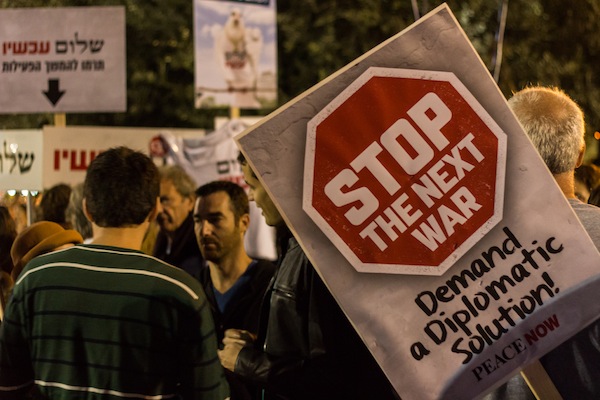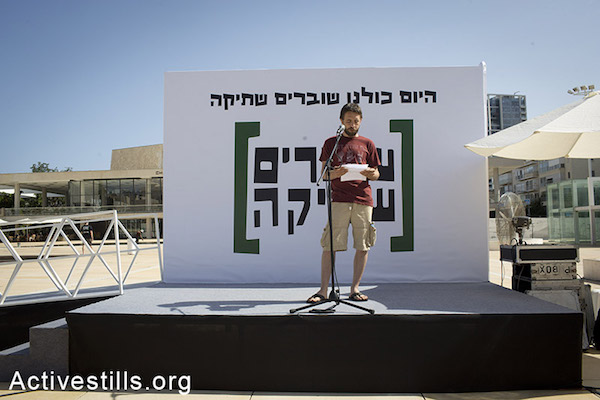Without recognizing how deep-seated the trauma of ordinary Israelis really is, the Israeli peace camp will continue to be seen as elitist and disconnected.
By Yakir Englander (translated by Dr. Henry R. Carse)

My political opinions are aligned with Israel’s Left, but I was not born that way. Even today my personal Israeli narrative is far from typically liberal. I grew up in a modern ultra-Orthodox Jewish community in the city of Bnei Brak, and although I am sociologically far from that context today, many of the core values that still influence me stem from the Hasidic tradition. When I was an adolescent, I became part of the religious settler movement. And while I am not connected to it today, the courage that I witnessed in that society, one that allows you to take action in the real world, remains with me until this day.
I understand that I may have no choice but to support a two-state solution to the Israeli-Palestinian conflict. Unlike the majority of the “moderate Zionist Left” in Israel, however, including opposition leader Isaac Herzog, I see the establishment of two states as a painful separation. This solution will tear me apart from my dearest Palestinian colleagues, as more walls and checkpoints will put an end to our daily contact with each other.
In recent years, I have founded and worked as part of an interfaith peace organization that seeks to an end to the conflict. And still, like many Israelis, I find myself further and further from the Israeli Left, be it moderate, Zionist or radical. There are two reasons for this: firstly, because the leaders of the Left act similar to religious preachers who claim to know the Truth, even when it is ideological rather than divine. Their grasp of the Truth makes it hard for them to listen to others enter into a genuine dialogue. Secondly, I cannot relate to the leaders of the Left because of their language, which falls far short of expressing the complex emotions of fear and pain that I hear every day on the streets of Jerusalem.
Stop blaming the traumatized
There is something tempting in the Truth: it protects people from the need to remember, every single minute, that they might be wrong. Certainly, this is why some are attracted to religion: it promises them access to the Truth.
It is fascinating to note that it was in fact Orthodox Judaism that was most pressed to compromise for generations on its ideas of Truth while living in the diaspora. Living in exile as a minority in a non-Jewish culture, Jews had little power, and they often had to act in ways that contradicted the commandments of divine Truth. A good example is the dictate of Jewish law known as “for the sake of peace,” according to which Jews must be sensitive to the values of their non-Jewish neighbors. This principle taught Jews to conduct themselves within non-Jewish society in ways that often starkly contradicted the letter of divinely ordained Jewish law, all for the sake of good relations with the non-Jewish world.

The Babylonian Talmud (written in the diaspora) took this idea a step further when it explained that “Jerusalem was destroyed because the Jewish people living there based all their judgments only on the divine Torah.” Remarkably, it was this uncompromising insistence on the Truth of divine halakha (Jewish law) that brought upon the fall of Jerusalem. This is because reality is always more complex, and often requires the humility to take a step back from the Truth.
By contrast, statements by the leaders of Israel’s Left reference notions such as the Truth or justice without any flexibility or understanding of how complex reality is here. “The Right has lapsed into fantasy,” says Stav Shaffir, “and only the Israeli Left – ‘mature and responsible’ – remains reasonable, with true and serious plans for the future.” The late Yossi Sarid spoke of the separation of left from right as “a separation in the State of Israel between the sane people and the Messianics…” These are only two examples among many.
Such language is problematic. Firstly, it is easy to counter the Truth that such language claims to represent. For example, one may challenge the assumption of Israel’s Zionist Left that there is an essential difference between the occupation of the West Bank in 1967 and the earlier Jewish expropriation of Palestinian land in Tel Aviv, Galilee, Jerusalem and elsewhere from the beginnings of the Zionist movement in the early 20th century. The Truth is always open to interpretation.
Another problem with claims to the Truth lies in their appeal to logic and reason, while human beings are in fact composites of reason and feelings, often with pain and trauma etched deeply into the human body and psyche.

The Second Intifada was at its height by the time I completed my army service and enrolled at Jerusalem’s Hebrew University. My reserve duty required me to serve in a unit that identified the remains of victims, and I was called to several scenes of painful terror attacks. The personal crisis I experienced there led me to my first encounters with the Left: Israelis and Palestinians at Hebrew University. I came to their meetings feeling very confused, with no idea what was right, as well as a burden of pain and trauma. At the meetings people were busy mocking political leaders, the failed peace agreements, the corrupt occupation, and religion as the root of the disastrous reality. Everyone agreed that only speedy progress toward a two-state solution could bring about peace and justice.
I remember coming away from these meetings with a heavy feeling — that I was being blamed for living in a reality of ongoing trauma (terror and violence had not et ceased). At the same time, I felt I was being told that I must abandon the two things that had been able to give me any sense of safety: the army and religion. I stopped going after a few meetings, realizing that I had left an ultra-Orthodox society that demanded my total allegiance to its Truth, only to align myself with a new political form of ultra-orthodoxy.
Talking about the Truth is important and valuable for those few people who dedicate their lives to understanding what is “right” and what is not. These days, however, Israeli society is not really being helped by lectures about how wrong and harmful it is. Not because Israeli policies are not harmful, but because there is no spiritual ability today to listen to these criticisms. As the Rabbi from Radin put it: “The obligation to convince someone can be practiced only when they are actually able to hear you.”
Israeli society needs leaders who are capable of speaking to this society’s pain and fear, who through dialogue with our feelings can free us from the powers that are destroying Israelis and Palestinians alike. We need leaders who show by example how to sacrifice part of their own Truth in order to heal wounds and bring about transformation. The Israeli peace camp must not be defined by the Left; it should include all who are ready to dedicate themselves to the process of healing themselves, and in this way to cease harming the Palestinians.
Negotiations with tears
We need a peace movement that will stop clashing with the Right about what is right what is wrong. For example, I am far less worried about whether every piece of evidence presented by Breaking the Silence is proven to be exact the military investigators. What is more important is to realize that thousands of Israelis who risk their lives in the defense of their country return home as I did, traumatized and in crisis. That we realize the crisis stems from the assumption that the army is purely a defensive one.

Daily confrontations between politicians from the Left and the Right only serve to emphasize the failure of the Left. Right-wing activists do not solely engage with logic. They bring up issues that relate to the fears that reside deep in our Jewish and Israeli D.N.A.. All these relate somehow to the conflict and its solution: shaking the moral foundations of the IDF; the feeling that Israeli critics are not speaking with their opponents but about them; the fear of non-Jews; the deep-seated suspicion of Palestinians and their leaders; the anxiety that if peace comes, Jews will marry non-Jews; and the underlying pain stemming from the conviction that Europe has never really come to terms with the trauma of the Holocaust.
The Israeli Left speaks about democratic values, but the Israeli public generally sees “Western values” as a language of logic — one that fails to speak to our hearts. If only the Israeli Left could speak to the people of this nation with the voice of 2,000 years of Israeli-Jewish culture, it is likely that the silent majority of Israelis would stand up and join the effort for peace.

The discussion of Dorit Rabinyan’s novel “Borderlife,” which was recently disqualified from the national curriculum by the Education Ministry, would be richer if the Israeli Left could cite examples of how the Kabbalist sages of North Africa would once study together with the Muslim Sufis, or if leaders of the Left could show that they themselves had demanded that the national curriculum include the painful poetry of expelled Jewish settlers from Gaza. The credibility of Breaking the Silence would only increase if they spoke about talmudic rabbis who insisted on learning from or with those who criticized the rabbinate.
The Israeli Left must internalize that a peace agreement between Israelis and Palestinians will not begin when the two sides sit down at the negotiating table. Rather, the agreement begins today, yesterday, and tomorrow, within and together with the people — all people.
There is an old story of a couple who came to Rabbi Karelitz, chairman of the rabbinical court on Bnei Brak, before their marriage, asking how to achieve a healthy life together. The rabbi answered them curtly: “If you wanted advice on living together, you should have come to me 18 years ago!” When parties to an agreement sit down to negotiate, the spiritual orientation of the negotiators — and of the peoples they represent — is already formed. Their ability to compromise is limited by the existential situation of the societies they speak for. It is the work of the Israeli peace camp to work with the Israeli public (the same, of course, holds true for Palestinian leaders) so that the public, and their leaders, will approach the negotiations in a spiritual state that is as conducive as possible to achieving a healthy agreement. To this end, the peace camp must create and speak a new language — or become irrelevant.
The Israeli peace camp must become an open house for every Israeli, no matter what their orientation: orthodox, religious-Zionists, Mizrahin, expelled settlers from Gaza, Palestinian citizens of Israel, Jerusalemites, settlers, Ethiopians, and all the rest. The peace camp must use a language of dialogue with all people, even those who do not agree with its arguments. It must understand that Jewish culture (and not just orthodoxy) must be part of the culture of the Left, rather than viewing it as a stumbling block.
Jerusalem was destroyed only because those who lived there based their judgments on divine law. Jerusalem will be rebuilt only by those who are capable of embracing the pain we share, gathering our tears, and bringing them to the negotiating table.
Yakir Englander is the project director of Kids4Peace International and a Shalom Hartman scholar. This article was first published in Hebrew on Local Call. Read it here.

